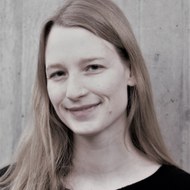Dissertations and habilitations
Annelie Bachmaier: "Polish and Ukrainian Literature in Argentina (from the interwar period to c. 1980): Identity, Interculturality, Intertextuality" (since 4/2019, Habil.)
 © Annelie Bachmeier
© Annelie Bachmeier
Research Associate
NameDr. Annelie Bachmaier
Chair of Slavic Literatures
Send encrypted email via the SecureMail portal (for TUD external users only).
Visiting address:
Bürogebäude Wiener Straße, Room 216 Wiener Straße 48
01219 Dresden
Office hours:
- Wednesday:
- 12:00 - 13:00
The monograph project "Not only Gombrowicz. Polish literature in Argentina from the 1930s to the 1980s between marginality and entanglement" (working title) represents pioneering work in two respects: On the one hand, it provides the first detailed and comparative exploration of Polish-Argentinean literature in the 20th century, which - with the exception of the world-famous writer Witold Gombrowicz - is almost completely unknown and largely ignored by researchers. On the other hand, by including texts in three languages (Polish, Yiddish, Spanish), it brings together perspectives on the Polish diaspora in Argentina that have hitherto been strictly separated by disciplines.
The analysis, which focuses on the literary processing of migration experiences, contextualizes the global phenomenon of “Polish literature outside Poland”, which is important for Polish culture, as well as migration and exile literature in general. The project is located at the interdisciplinary intersection of Polish Studies, Yiddish Studies and Romance Studies in order to do justice to the linguistic and ethnic diversity and interconnectedness of the Polish literary landscape in Argentina.
____________________________________________________________________________________
Dr. Tatiana Vaizer: "Intrusion into the Order: Phenomenon of the Russian Public Sphere in 2010-2020s" (since 5/2019, Habil.
 © Dr. Tatiana Vaizer
© Dr. Tatiana Vaizer
Research Associate
NameDr. Tatiana Vaizer
Chair of Slavic Literatures
Send encrypted email via the SecureMail portal (for TUD external users only).
Visiting address:
Bürogebäude Wiener Straße, Raum 216 Wiener Straße 48
01219 Dresden
Office hours:
- Thursday:
- 10:00 - 12:00
The work is devoted to grass-roots strategies of democratization of the public sphere in Russia during the third and fourth periods of Putin's rule, i.e. the period of hesitation from conditional liberalization to authoritarian monopolization or imitative democratization of the public sphere in Russia.
By public sphere we mean the space where socially significant discourses are articulated and where participants enter into public communication in order to express a situation that is significant for them, to identify the positions of the sides, to find a solution to a significant problem or to reach a consensus. Public spaces can be open urban spaces (parks, streets, squares, public halls), media / television platforms and media, internet portals and social networks.
The concept of the public sphere is primarily defined by the concept of politics according to Hannah Arendt: the public sphere is political per se because it transcends purely social and economic boundaries and aims to engage in an argumentative debate on generally significant problems. I show that the official public sphere of post-Soviet Russia has lost this political meaning because it excludes the voices of different social and political groups as insignificant. The aim of the research is to trace how the political (i.e. the ability to discuss socially significant issues from different perspectives on an equal footing) returns to the Russian public sphere through grass-roots democratization.
I also show that in modern Russia we can talk about different public spaces that are heterogeneous and in which socially heterogeneous participants form different discourses (on different topics, with different goals, different logical and expressive means, etc.). Within the framework of this heterogeneous public sphere, communication is formed that has political significance and is important for the formation of a new liberal-democratic political discourse in post-Soviet Russia.
Furthermore I pay special attention to the elusive, non-obvious ethical implications or overtly formulated ethical values that define public communication in modern Russia. I analyze the empirical realities of the Russian public sphere 2010-2020 (street protests, public lectures and discussions, open correspondence of Russian intellectuals, etc.) in the light of Western and Russian theories of the public sphere and public communication.
Exposé of the habilitation (GER)
____________________________________________________________________________________
Vladislav Tarnopolski: "(Un)Political Music: The Ecosystem of New Music in Russia from 1991 to 2022" (since 12/2024, Diss.)
 © Vladislav Tarnopolski
© Vladislav Tarnopolski
Vladislav Tarnopolski
The worldview and artistic models that shaped the Russian cultural scene between 1991 and 2022 were not only a specific reflection of the contradictory political processes of the time, but also became part of the mechanism that produced them.
The aim of this work is to describe the operating principles of the "ecosystem" of new music in Russia in the period from 1991 to 2022 in the context of the cultural and political ideologems of the time. The ecosystem is understood as the cumulative activity of musical institutions, societies and individual creators and their results (works, ideas, projects). New music is interpreted according to Adorno as a set of avant-garde and post-avant-garde practices that trace their genealogy back to classical music.
The most important projects and documents of cultural politics, concepts and manifestos of the composers around whom micro-communities of musicians were grouped, as well as the corpus of musical works that correlate with the political content of the epoch are examined. The conceptual generalization and political-discursive analysis of this diverse material is carried out within the framework of Pierre Bourdieu's field theory. One of the main categories of the study, habitus, is understood as a mechanism that generates ideological and musical concepts, modes of compositional practices, curatorial strategies and social preferences.
Exposé of the dissertation (GER)
____________________________________________________________________________________
Yulia Penner: "Geometry of (urban) spatial modeling: Russian and Czech literature of limited sovereignty" (since 11/2020, Diss.)
 © Yulia Penner
© Yulia Penner
The dissertation "Geometry of (Urban) Spatial Modeling: Russian and Czech Literature of Limited Sovereignty" combines scientific fields such as mathematics and geometry with those from the humanities that deal with literature, media, culture and history. It deals with literary and mathematical (drawing) methods as factors in the genesis of the texts and maps the literature with regard to a cultural-analytical history of science.
The dissertation examines the works of three authors - Iosif Brodskij (1940-1996) (Leningrad poetics), Dmitrij Prigov (1940-2007) (Moscow conceptualism) and Michal Ajvaz (1949) (Prague text). In particular, the notations of two systems are discussed - the notation systems of mathematics (mathematical theories, mention of scientists, use of mathematical form(s) and geometric signs) and geometric drawing as a special part of mathematics. Mathematical notations - letters, formulas, etc., which I would like to look at from a literary-scientific perspective, are separated from the geometric ones. I look at these in turn from a historical and cultural studies perspective. I will analyze how the works take up practices and aesthetics of the Russian avant-garde - by Velimir Khlebnikov (1885-1922), Vladimir Mayakovsky (1893-1930) and others - in different ways.
Exposé of the dissertation (GER)
____________________________________________________________________________________
Completed dissertations
Dmytro Memari Fard: "The first German-language complete edition of F. M. Dostoyevsky's works and the politicization of world literature"
 © Dmytro Memari Fard
© Dmytro Memari Fard
Dmytro Memari Fard
The works of Dostoyevsky published by the young Piper Verlag were not only the first German-language complete edition of the author's works, but also the most popular in the German-speaking world for decades. This study deals with a detailed analysis of the translation in the complete edition in direct comparison with the original. The prefaces and introductions, which were written by Arthur Moeller van den Bruck and Dmitrij Sergejevič Merežkovskij, among others, provide an insight into the personal level of the authors and their opinions on Dostoyevsky, Russia and Germany. In the course of the complete edition, negative descriptions of the Germans are embellished in many places, while the changes in the characteristics of the Russians can be placed in the phases before, during and after the First World War. In some places, entire paragraphs are missing, while some new ones have been added. Overall, the analysis reveals clear structures and trends. One of the main aims of this thesis is to prove the intentionality behind the individual conspicuous features.
Exposé of the dissertation (GER)
____________________________________________________________________________________
Maksim Lepekhin: "Literary samizdat journals: communication and knowledge networks of the late Soviet underground"
 © Maksim Lepekhin
© Maksim Lepekhin
Maksim Lepekhin
Soviet unofficial literature existed to a large extent thanks to a ramified system of press and communication organs that has not been thoroughly researched to this day. As long as the individual facts have not been pieced together to form an overall picture, research must assume that each journal had its own clear subject matter and aesthetic or ideological position. However, this assumption needs to be re-examined: the samizdat periodical was a far more complex entity whose functioning depended on a multitude of facts and mechanisms: the politics of the editorial offices, short-term decisions and the struggle of values within the circles.
In my work, I will start from the existence of some, if not conflicting, then at least mutually corrective discourses in uncensored communities, which were transmitted via the medium of samizdat periodicals and changed over time. Researching them makes it possible to show the dynamics of aesthetic horizons and, more generally, the members' horizons of meaning, which in many respects determined the processes taking place within them (e.g. the dominance of some aesthetic systems over others).
In order to reconstruct today how the actors of unofficial literature themselves imagined the literary (and to the same extent - the socio-political) process in which they were involved and which they themselves established, it is essential to study not only manifestos in detail, but also, for example, reviews, polemical replicas, necrologies and many other genres and statements. This in turn allows us to determine the possible space of (artistic) expression in which the members of different communities operated and which influenced the development of poetic systems.
